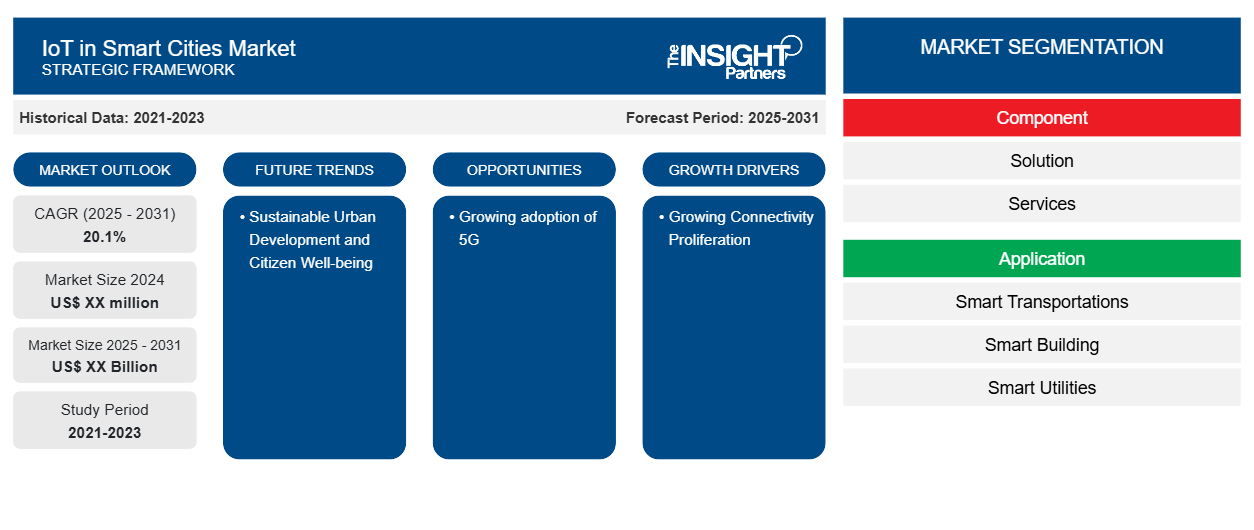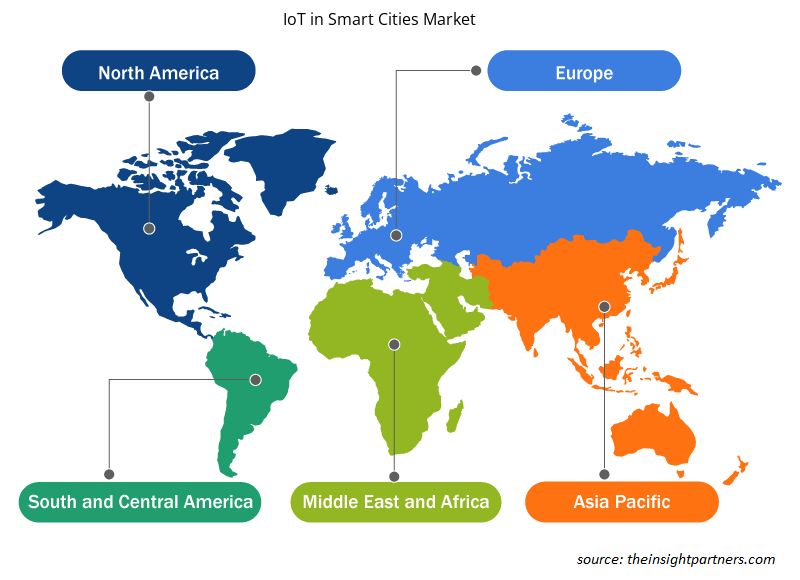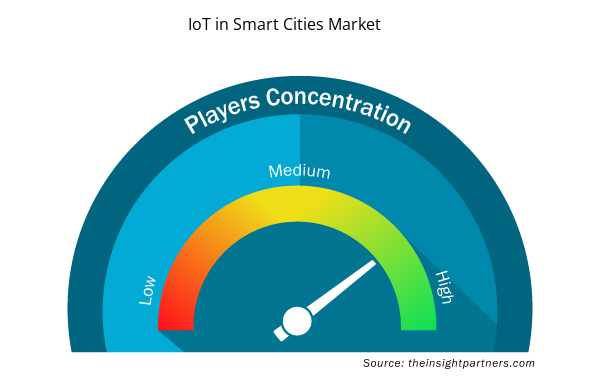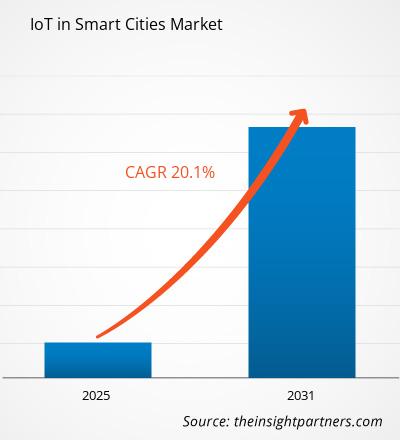The IoT in Smart Cities Market is expected to register a CAGR of 20.1% during 2023–2031. Growing adoption of 5G is likely to remain a key trend in the market.
IoT in Smart Cities Market Analysis
- The implementation of IoT technology in smart cities helps in the development of sustainable, eco-friendly, resourceful, competent, and connected urban centers. The growth of the market is fueled by the penetration of IoT in smart city systems, which provides comfort, productivity, and preservation of the environment for citizens.
- In addition, the increasing use of 5G technology provides ample growth opportunities for different IoT applications in smart cities as it allows ultra-low latency, high speed, and massive connectivity for smart devices in smart cities.
- The growth of the market is also dependent on the increasing government policies towards the development of smart cities and public-private partnership (PPP) models, and IoT and its potential implications on the communication infrastructure in the future.
IoT in Smart Cities Market Overview
- IoT-enabling technologies for smart cities include the deployment of interconnected IP-enabled hardware devices, machines, sensors, and urban infrastructure. IoT smart cities leverage networked hardware devices and sensors along with data analytics to allow for heightened efficiencies, reduced energy consumption, and improved quality of life.
- Using IoT, smart cities can provide real-time data on traffic flows, air pollution, energy use, infrastructure efficiency, and building safety to aid city planners and decision-makers in the planning and delivery of services and more efficient use of resources.
- IoT in smart cities can also enable the establishment of smart grids, intelligent transportation systems, and urban monitoring solutions to improve the connectedness, sustainability, and responsiveness of the city. The use of IoT technologies can help make smart cities better places to live and work while reducing the impact of cities on the surrounding environment.
Customize This Report To Suit Your Requirement
You will get customization on any report - free of charge - including parts of this report, or country-level analysis, Excel Data pack, as well as avail great offers and discounts for start-ups & universities
IoT in Smart Cities Market: Strategic Insights

- Get Top Key Market Trends of this report.This FREE sample will include data analysis, ranging from market trends to estimates and forecasts.
Customize This Report To Suit Your Requirement
You will get customization on any report - free of charge - including parts of this report, or country-level analysis, Excel Data pack, as well as avail great offers and discounts for start-ups & universities
IoT in Smart Cities Market: Strategic Insights

- Get Top Key Market Trends of this report.This FREE sample will include data analysis, ranging from market trends to estimates and forecasts.
IoT in Smart Cities Market Drivers and Opportunities
Growing Connectivity Proliferation to Favor the Market
- Universal connectivity infrastructure established by Wi-Fi, LPWAN, and cellular networks is enabling the ubiquitous deployment of IoT devices and sensors in urban areas.
- Smart cities can now leverage IoT technologies to optimize energy consumption, reduce traffic congestion, enhance public security, elevate the quality of life for citizens, and more.
- Furthermore, the growing technological adoptions like 5G networks, edge computing, and artificial intelligence are enabling IoT solutions with unprecedented levels of performance, efficiency, and intelligence along with high-speed, low-latency connectivity, real-time processing, and advanced analytics. Thus, the growing connectivity proliferation is driving the growth of the IoT in the smart cities market.
Sustainable Urban Development and Citizen Well-being
- The use of IoT technologies can be key to addressing many critical challenges related to the development of smart cities, such as congestion and traffic, energy efficiency and management, environmental pollution, public safety, and security.
- Smart-city applications enabled with IoT can implement innovative solutions to support intelligent transportation, energy management and conservation, environmental monitoring, early detection of emergency and security situations, and many other functions.
- These initiatives will create liveable, more resilient, and sustainable urban environments and improve urban life for citizens. Moreover, the market for IoT in Smart Cities provides opportunities for wider societal benefits.
- Smart cities can develop citizen-centric services such as smart healthcare, education, and civility promotion to enhance urban society. The sustainable development of urban communities and the well-being of citizens are likely to be the most important future market growth opportunities.
IoT in Smart Cities Market Report Segmentation Analysis
Key segments that contributed to the derivation of the IoT in Smart Cities Market analysis are component and application.
- Based on components, the IoT in the smart cities market is divided into solutions and services. The solution segment is further sub-segmented into remote monitoring, real-time location systems, network management, security management, data management, and others. The services segment is further sub-segmented into professional services and managed services.
- based on application, the market is divided into smart transportation, smart building, smart utilities, and smart citizen services.
IoT in Smart Cities Market Share Analysis by Geography
- IoT in Smart Cities Market report comprises a detailed analysis of five major geographic regions, which includes current and historical market size and forecasts for 2021 to 2031, covering North America, Europe, Asia-Pacific (APAC), Middle East and Africa (MEA), and South & Central America.
- Each region is further sub-segmented into respective countries. This report provides analysis and forecasts of 18+ countries, covering IoT in Smart Cities Market dynamics such as drivers, trends, and opportunities that are impacting the markets at the regional level.
- Also, the report covers PEST analysis, which involves the study of major factors that influence the IoT in the Smart Cities Market in these regions.
IoT in Smart Cities Market Regional Insights
The regional trends and factors influencing the IoT in Smart Cities Market throughout the forecast period have been thoroughly explained by the analysts at Insight Partners. This section also discusses IoT in Smart Cities Market segments and geography across North America, Europe, Asia Pacific, Middle East and Africa, and South and Central America.

- Get the Regional Specific Data for IoT in Smart Cities Market
IoT in Smart Cities Market Report Scope
| Report Attribute | Details |
|---|---|
| Market size in 2024 | US$ XX million |
| Market Size by 2031 | US$ XX Billion |
| Global CAGR (2025 - 2031) | 20.1% |
| Historical Data | 2021-2023 |
| Forecast period | 2025-2031 |
| Segments Covered |
By Component
|
| Regions and Countries Covered | North America
|
| Market leaders and key company profiles |
IoT in Smart Cities Market Players Density: Understanding Its Impact on Business Dynamics
The IoT in Smart Cities Market market is growing rapidly, driven by increasing end-user demand due to factors such as evolving consumer preferences, technological advancements, and greater awareness of the product's benefits. As demand rises, businesses are expanding their offerings, innovating to meet consumer needs, and capitalizing on emerging trends, which further fuels market growth.
Market players density refers to the distribution of firms or companies operating within a particular market or industry. It indicates how many competitors (market players) are present in a given market space relative to its size or total market value.
Major Companies operating in the IoT in Smart Cities Market are:
- Cisco Systems
- Honeywell International Inc.
- Huawei Technologies Co., Ltd.
- IBM Corporation
- Intel Corporation
- Microsoft Corporation
Disclaimer: The companies listed above are not ranked in any particular order.

- Get the IoT in Smart Cities Market top key players overview
IoT in Smart Cities Market News and Recent Developments
The IoT in Smart Cities Market is evaluated by gathering qualitative and quantitative data post primary and secondary research, which includes important corporate publications, association data, and databases. A few of the developments in the IoT in the Smart Cities Market are listed below:
- IBM announced a new request for proposals from government and non-profit organizations for the IBM Sustainability Accelerator, focused on technology-driven projects to advance city resiliency. (Source: IBM, News, March 2024)
- Honeywell and Accelerator for America announced the launch of the Honeywell Smart City Accelerator Program to help cities strategically plan their futures and build capacity to fund transformational initiatives. Honeywell is engaging with five U.S. cities to provide in-kind support to accelerate progress on their smart city strategic planning. The cities are Cleveland, Louisville, Ky., Kansas City, Mo., San Diego, and Waterloo, Iowa. (Source: Honeywell, News, October 2022).
IoT in Smart Cities Market Report Coverage and Deliverables
The “IoT in Smart Cities Market Size and Forecast (2021–2031)” report provides a detailed analysis of the market covering below areas:
- IoT in Smart Cities Market size and forecast at global, regional, and country levels for all the key market segments covered under the scope.
- IoT in Smart Cities Market trends as well as market dynamics such as drivers, restraints, and key opportunities.
- Detailed PEST/Porter’s Five Forces and SWOT analysis.
- IoT in Smart Cities Market analysis covering key market trends, global and regional framework, major players, regulations, and recent market developments.
- Industry landscape and competition analysis covering market concentration, heat map analysis, prominent players, and recent developments for the IoT in Smart Cities Market.
- Detailed company profiles.
- Historical Analysis (2 Years), Base Year, Forecast (7 Years) with CAGR
- PEST and SWOT Analysis
- Market Size Value / Volume - Global, Regional, Country
- Industry and Competitive Landscape
- Excel Dataset



Report Coverage
Revenue forecast, Company Analysis, Industry landscape, Growth factors, and Trends

Segment Covered
This text is related
to segments covered.

Regional Scope
North America, Europe, Asia Pacific, Middle East & Africa, South & Central America

Country Scope
This text is related
to country scope.
Frequently Asked Questions
The global IoT in Smart Cities Market is expected to grow at a CAGR of 20.1% during the forecast period 2023 - 2031.
Growing connectivity proliferation is one of the major factors driving the IoT in the Smart Cities Market.
Growing adoption of 5G is anticipated to play a significant role in the global IoT in Smart Cities Market in the coming years.
The leading players operating in the IoT in the smart cities market are Cisco Systems, Honeywell International Inc., Huawei Technologies Co., Ltd., IBM Corporation, Intel Corporation, Microsoft Corporation, SAP SE, SAS Insitute, Inc., Schneider Electric, and Siemens AG.
The report can be delivered in PDF/PPT format; we can also share the Excel dataset based on the request.
Some of the customization options available based on request are additional 3–5 company profiles and country-specific analysis of 3–5 countries of your choice. Customizations are to be requested/discussed before making final order confirmation, as our team would review the same and check the feasibility.
Trends and growth analysis reports related to Technology, Media and Telecommunications : READ MORE..
The List of Companies
1. Cisco Systems
2. Honeywell International Inc.
3. Huawei Technologies Co., Ltd.
4. IBM Corporation
5. Intel Corporation
6. Microsoft Corporation
7. SAP SE
8. SAS Insitute, Inc.
9. Schneider Electric
10. Siemens AG

 Get Free Sample For
Get Free Sample For